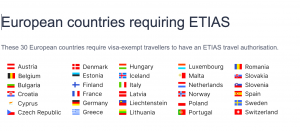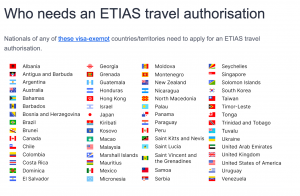International students from visa-exempt countries planning to attend study programs in the EU will be required as of next year to obtain ETIAS (European Travel Information and Authorization System) approval for 30 European countries, including 29 Schengen countries and Cyprus.
More specifically, as of 2025, students will be required to present ETIAS approval for entry and short-term stays of up to 90 days in any 180-day period in the 30 listed countries. For longer study programs, a student visa will be necessary.

Photo credit: ETIAS
Students can remain in Europe for up to 90 additional days after their student visa expires provided they have a valid ETIAS and are registered in the Entry/Exit System (EES).
In order to obtain ETIAS approval, students will need a passport valid for more than three months and not older than 10 years and an email address and must complete an online form and to pay a 7-euro fee.
Applications are submitted through the official ETIAS website.

Photo credit: ETIAS
ETIAS authorization is valid for a period of three years or until your passport expires and can be used for multiple entries.
In addition to ETIAS, students will also have to register with the EES, set to become operational in November and to facilitate visa-free travel procedures for those entering the EU.
ETIAS is not a visa but a travel authorization document which will apply to all travelers. Similar requirements are in place for the US (ESTA), Canada (eTA), Australia (ETA and eVisitor), and the UK (ETA).
Already delayed, ETIAS is expected to launch in mid-2025 a few months after the introduction of the EES. EU ministers endorsed the programs in 2023.



